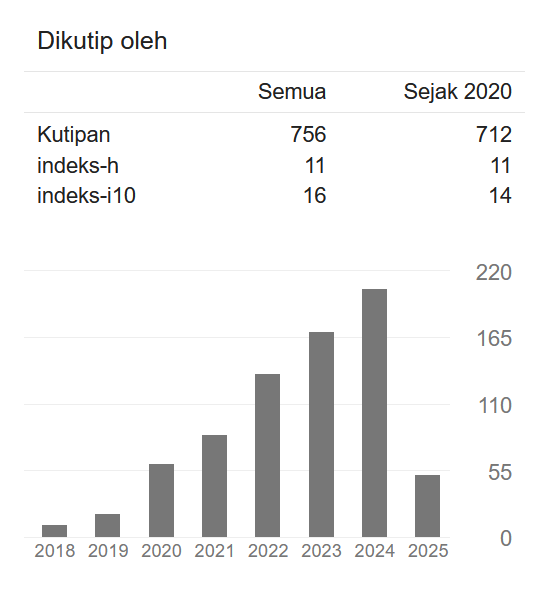Al-Ma'tsurat Zikr in Hadith Review: A Case Study of Students at Baitul Quran Al-Ghifari
DOI:
https://doi.org/10.19109/medinate.v21i2.28310Keywords:
Al-Ma’tsurat, dhikr, hadith analysis, islamic boarding school, spiritual well-beingAbstract
This study examines the analysis of hadith in the practice of Al-Ma’tsurat dhikr by students of Baitul Quran Al-Ghifari Islamic boarding school, located in Kecamatan Hamparan Perak, Desa Lama. The research aims to evaluate the authenticity and application of hadith used in Al-Ma’tsurat dhikr and its impact on the students’ spiritual, psychological, and social well-being. The research employs a qualitative approach, utilizing methods such as observation, interviews, and documentation. Data analysis involves evaluating the sanad (chain of narrators) and matan (content) of the hadiths to determine their authenticity, followed by examining the implementation and benefits of Al-Ma’tsurat dhikr among the students. The findings indicate that the majority of the dhikr in Al-Ma’tsurat are based on authentic (sahih) and reliable (hasan) hadiths, with a few exceptions of weak (dhaif) hadiths. The regular practice of Al-Ma’tsurat dhikr significantly enhances the students' tranquility, reduces stress, strengthens their faith, and fosters solidarity and togetherness within the community. Additionally, the practice of dhikr helps in the formation of disciplined and spiritually strong characters among the students. This research highlights the importance of ensuring the authenticity of hadiths used in religious practices and the significant benefits of regular dhikr practice in educational settings. The study concludes with recommendations for reinforcing dhikr materials, developing comprehensive dhikr programs, enhancing educational quality, and conducting further research on the broader impacts of dhikr.
References
Al Faruq, U., & Noviani, D. (2021). Islam Program Studi Pendidikan Agama Islam Jurnal TAUJIH Jurnal Pendidikan Islam Program Studi Pendidikan Agama Islam. Jurnal TAUJIH Jurnal Pendidikan, 14(01), 58–77. https://ejournal.iaiqi.ac.id/index.php/taujih/article/view/91
Anastasya, Y. A., & Harun, N. (2024). Psychoeducation Regarding the Role of Dhikr in Individual Psychological Welfare at SMAN 1 Banda Baro. Jurnal Psikologi Terapan, 7(2), 63–68. https://doi.org/https://doi.org/10.29103/jpt.v5i2.10424
Aris, H., Yusoff, M. F. B. M., Halim, A. B. A., Muslim, N., Alias, J., & Mat, N. (2024). Mudraj Hadith and Its Relationship with the Art of Hadith Text Criticism. International Journal of Religion, 5(10), 740–753. https://doi.org/10.61707/6nyyc214
Busetto, L., Wick, W., & Gumbinger, C. (2020). How to use and assess qualitative research methods. Neurological Research and Practice, 2(1). https://doi.org/10.1186/s42466-020-00059-z
Kamil, A., Islam, U., Indonesia, I., & Progress, A. (2024). AL-HADITH AL-GHARIB IN THE DISCOURSE OF HADITH STUDIES ; THE AUTHENTICITY AND THE. Journal Of Hadith Studies, 9(2), 23–24.
Makwana, D., Engineer, P., Dabhi, A., & Chudasama, H. (2023). Sampling methods in research: A review. International Journal of Trend in Scientific Research and Development, 7(3), 762–768. https://www.researchgate.net/publication/371985656
Munawaroh, M., & Ravico, R. (2023). The Study of Living Qur’an on Al-Ma’tsurat Recitation Tradition at Darul Qur’an Islamic Boarding School Pendung Talang Genting. Takwil: Journal of Quran and Hadith Studies, 1(2), 69–80. https://doi.org/10.32939/twl.v1i2.1556
Rahman, M. M. (2024). Islamization: A Sociological Approach. Indonesian Journal of Islamization Studies, 1(2), 197–231. https://doi.org/10.21111/injas.v1i2.10793
Sartika, E., & Ningsih, I. (2024). THE FUNCTIONAL SIGNIFICANCE OF RECITING DHIKR AL-MA’THURAT: EXPLORING THE LIVING QUR’AN IN TAHFIZ INSTITUTION. Mushaf: Jurnal Tafsir Berwawasan Keindonesiaan, 5(1), 47–73. https://doi.org/10.33650/mushaf.v5i1.10308
Shahbaz Van Ahsen, M., & Hendayani, R. (2022). Consumer Behavior toward Halal Food Using Theory of Planned Behavior and Theory of Interpersonal Behaviors among Muslim Students in Tasikmalaya. Jurnal Ilmu Sosial Politik Dan Humaniora, 5(2), 33–42. https://doi.org/10.36624/jisora.v5i2.87
Winda, H. (2023). Analysis Of Dhikr Toward Peace Of Mind: Islam In Psychological Approach. International Jurnal Of Sociology Of Religion (IJSR, 01(01), 115–127.








